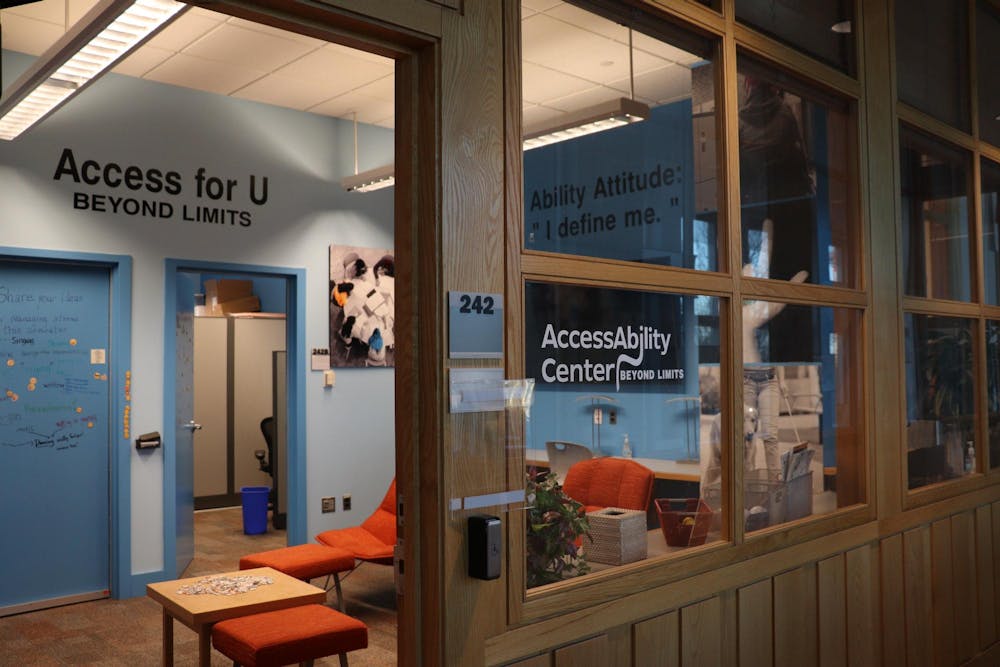Since its establishment in 2006, the Office of Disability Services (ODS) has expanded its scope to serve Princeton students with disabilities and to provide resources through the AccessAbility Center. Liz Erickson, the director of accessibility and disability services, retired last month after working in the Office of Disability Services for 17 years.
The University is currently selecting a replacement for Erickson. In an email to The Daily Princetonian, University Spokesperson Michael Hotchkiss wrote, “The University is conducting a national search for a new director. A search committee composed of stakeholders across the campus will provide candidate feedback to the Vice Provost for Institutional Equity and Diversity, who serves as hiring manager.”
While the University is in the final stages of this hiring process, former Assistant Director of Accessibility and Disability Services Asha Nambiar is serving as the current acting director, according to Erickson.
Erickson’s retirement marks another moment of turnover for University administration. Administrators, including Dean of the College Jill Dolan, the Director of the Office of Sustainability Shana Weber, and the Deputy Dean of Undergraduate Students Thomas Dunne all announced their leave from the University in the past year.
Erickson first came to the University in 2006 as a temporary employee from Johnson & Johnson Staffing Resources “on the first day that the Office of Disability Services was operational,” she wrote in a statement to the ‘Prince.’ She took a permanent position as an office coordinator soon after, recognizing “the value in serving students with disabilities at Princeton.” Erickson became director after advancing in the office for 10 years.
According to Hotchkiss, the role of director for disability services “expanded significantly during Liz Erickson’s tenure, including through the creation of the AccessAbility Center.”
The AccessAbility Center was founded in the spring of 2017 as a “student gathering space on campus designed for universal access and intended to foster conversation about ability, access, and difference,” according to the ODS website.
Erickson wrote that she established the center after she “realized that students with disabilities did not have a space or voice on campus, as other marginalized populations did.” She hoped to create a space where students could come together and learn about disability as a facet of diversity.

According to Erickson, “The AccessAbility Center has been instrumental in educating our campus community and increasing awareness of disability.”
The AccessAbility Center, located on the second floor of Frist Campus Center, is designed to accommodate differing abilities so that all Princeton students can feel welcome there. For example, there are multiple lighting options in the center to allow students with sensory sensitivities to choose the lighting that works best for them.
Erickson also created the Allies for Access program in January 2023 to provide training for students and faculty interested in understanding disability and accessibility. ODS surveyed Princeton students with disabilities to see what they wanted other people on campus to know about disability, and Erickson’s team created a training module based on this information. The Allies for Access training program has been offered five times so far, and 130 people have completed it.
“While the training establishes the foundation, the program doesn’t stop there. Allies are charged with actively supporting people with disabilities and looking for opportunities to improve access on campus,” Erickson wrote.

In an interview with the ‘Prince,’ AccessAbility Fellow Harper Chambers ’24 said that before Erickson’s development of programs like the AccessAbility Center, “ODS was a legally mandated office to ensure base level conditions for people with disabilities. It wasn’t something that fully pushed for the kind of access and inclusion that people with disabilities on our campus truly deserve.”
Chambers noted that Erickson was careful to train and mentor many people across Princeton — in ODS, the AccessAbility Center and administrators across campus — to ensure that her vast institutional knowledge of accessibility at Princeton endures beyond her retirement. For example, Erickson often collaborated with Michael Barnes, the inaugural director of Campus Accessibility, to ensure that accessibility is addressed across the administration — not just by ODS.
Erickson’s role at ODS often involved working directly with students. Chambers added that Erickson was one of his “biggest supporters and biggest advocates” as he went through the process of being formally diagnosed with autism.
As an AccessAbility Fellow, Chambers was able to directly discuss his personal concerns about testing accommodations with Erickson, who directed him towards resources to obtain and pay for diagnostic evaluations. ODS was a source of information for Chambers to understand his diagnosis, exam accommodations, and his relationship with disability.
After Erickson retires, the new director of disability services will have to contend with new challenges posed by ongoing campus construction projects, as well as continue to assess the restrictions posed by older buildings on campus.
Erickson wrote, “The University is currently doing an accessibility audit of internal building spaces to ascertain what improvements can be made and to enhance our digital wayfinding system with accessibility information.”
Looking to the future, Erickson wrote, “I believe that we now have in place an amazing team of administrators who will focus on continually improving access for people with disabilities. The continuation of programming through the AccessAbility Center will also have a tremendous impact on changing the campus culture by educating our community.”
Sofia Arora is a News contributor for the ‘Prince.’
Thomas Catalano is a News contributor for the ‘Prince.’
Please send any corrections to corrections[at]dailyprincetonian.com.








